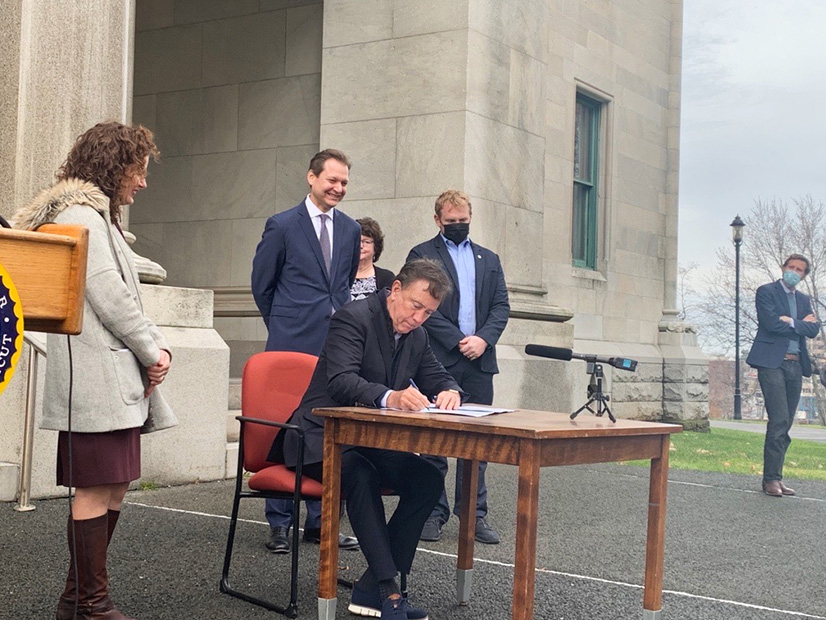
An executive order that Connecticut Gov. Ned Lamont signed Dec. 16 will help the state direct federal infrastructure funding to climate solutions, Department of Energy and Environmental Protection Commissioner Katie Dykes said Tuesday.
The order on reducing carbon emissions and adapting to climate change continues the state’s efforts to implement the recommendations issued by the Governor’s Climate Change Council (GC3) last January.
Allocations that come from the federal Infrastructure Investment and Jobs Act will “help to jump-start and catalyze a lot of the climate solutions that we’ve been focused on as part of the GC3 for both reducing emissions and protecting communities from the impacts of climate change,” Dykes said during a webinar hosted by the DEEP Office of Climate Planning.
Strategic planning efforts that come from the governor’s order, Dykes said, will put the state in a position to capture the emission reduction and adaptation benefits from the investment of federal dollars.
The order includes 23 directives for state agencies related to transportation, buildings, resilience, jobs, land use, and equity and justice.
State agencies will take action under the order in accordance with the authorities of the executive branch, but Dykes said the order is “not a substitute for further legislative partnership and action.”
“We’re eager to continue … working on a legislative agenda that will help to accelerate our ability to invest in climate mitigation and adaptation and resilience,” Dykes said.
Climate Leadership
The order also advances the GC3’s commitment to environmental justice by creating the Connecticut Equity and Environmental Justice Advisory Council (CEEJAC) within DEEP.
Part of CEEJAC’s mission will be to integrate environmental justice considerations into DEEP’s rulemaking, permitting and compliance processes. The 15-member council must include three individuals who are members of communities of color, low-income communities or community-based organizations, or who are academics with relevant knowledge.
The order also addresses health equity by creating an Office of Climate and Public Health within the Department of Public Health.
To enhance economic opportunities related to climate and energy investments, the order established the Connecticut Clean Economy Council to advise state agencies on how to strengthen state programs while lowering emissions. The council will meet quarterly to identify ways to ensure the state’s workforce is prepared to deliver climate-related solutions and has equitable opportunities to participate in the clean economy.
In addition, work by the GC3 will continue under the order. The council must prepare an annual progress report on mitigation and adaptation and resilience planning, starting with an initial report due at the end of this year.
Energy Planning
This year DEEP will update the state’s Comprehensive Energy Strategy as part of a periodic update. As usual the department will update the state’s energy needs related to electricity, heating, cooling and transportation, but Lamont also gave it new directives for the plan.
DEEP must identify ways to make heating and cooling more affordable while also reducing emissions from residential and commercial buildings and industrial processes to meet state emissions targets for 2030 and 2050. The update also must include options for making the energy sector more resilient to extreme weather and fuel price swings.
The agency will release details this week about the start of its planning process for the energy strategy update, according to Rebecca French, director of the Office of Climate Planning.
Transportation
Three directives in the order will address high emissions in the state’s transportation sector.
The Department of Transportation will stop funding the purchase of diesel buses by the end of next year and develop a strategic plan to address barriers to transitioning the state’s bus fleet to electric technologies. A separate DOT plan must identify investments for achieving a vehicle-miles-traveled reduction target for 2030.
By next January, DEEP must also release an assessment of the need to adopt California’s medium- and heavy-duty vehicle emissions standards to meet state climate goals.


